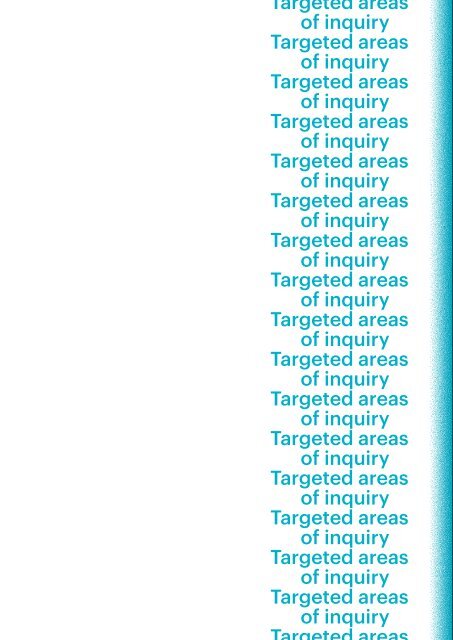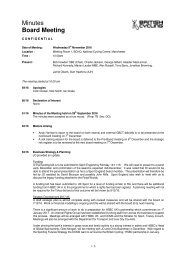The Pierre Elliott Trudeau Foundation Annual Report 2014–2015
ra-trudeau-2014-2015_en_web
ra-trudeau-2014-2015_en_web
Create successful ePaper yourself
Turn your PDF publications into a flip-book with our unique Google optimized e-Paper software.
Targeted areas<br />
of inquiry<br />
Targeted areas<br />
of inquiry<br />
Targeted areas<br />
of inquiry<br />
Targeted areas<br />
of inquiry<br />
Targeted areas<br />
of inquiry<br />
Targeted areas<br />
of inquiry<br />
Targeted areas<br />
of inquiry<br />
Targeted areas<br />
of inquiry<br />
Targeted areas<br />
of inquiry<br />
Targeted areas<br />
of inquiry<br />
Targeted areas<br />
of inquiry<br />
Targeted areas<br />
of inquiry<br />
Targeted areas<br />
of inquiry<br />
Targeted areas<br />
of inquiry<br />
Targeted areas<br />
of inquiry<br />
Targeted areas<br />
of inquiry<br />
Deep dives<br />
For the next three to five years, the <strong>Foundation</strong> intends<br />
to devote significant energy and resources to gaining<br />
fuller understanding of three areas of inquiry that are<br />
critical to Canada’s future: (1) pluralism, diversity,<br />
and the future of citizenship; (2) Indigenous relations in<br />
Canada; and (3) water, energy, and food security.<br />
Not only are these areas central to the well-being of<br />
Canadians and other citizens of the world, they are also<br />
areas where the <strong>Foundation</strong> has developed considerable<br />
expertise. Moreover, they are areas that require multidisciplinary<br />
and multisectoral perspectives and would<br />
benefit from sustained work over the next few years.<br />
In supporting initiatives related to the three targeted<br />
areas, the <strong>Foundation</strong> encourages its community<br />
members to work with partners in the broader community<br />
and in the public and private sectors. Successful initiatives<br />
will be anchored in rigorous research — involving<br />
fundamental or applied research, the arts, and the<br />
humanities — and will have practical significance.<br />
By virtue of its non-partisan nature, which favours no particular<br />
policy agenda, the <strong>Foundation</strong> is well positioned<br />
to play a convening role and to create a unique space<br />
conducive to informed dialogue in these areas.<br />
<strong>Foundation</strong> community members can help advance<br />
the body of knowledge and develop possible solutions<br />
in these areas in a number of ways. Some members<br />
may conduct research or work directly related to an<br />
area. Others may offer advice or ideas drawn from their<br />
experience in a different but relevant field.<br />
27<br />
Spotlight on three areas<br />
<strong>The</strong> following is an illustrative list of issues that<br />
may be contributed in each of our three targeted<br />
areas of inquiry:<br />
1 Pluralism, diversity, and<br />
the future of citizenship<br />
This area will address issues related to pluralism<br />
and social inclusion and will explore how<br />
the notion of citizenship might evolve. As a<br />
nation shaped by immigration, Canada faces<br />
issues concerning integration, citizenship,<br />
equity, human rights, diversity, and security.<br />
We also face the question of multiple<br />
identities: the reality that, in an increasingly<br />
globalized world, some of us will maintain<br />
an attachment to other countries that may<br />
challenge traditional concepts of citizenship.<br />
Also worthy of exploration is the accommodation<br />
and integration of marginalized<br />
groups, including disadvantaged individuals,<br />
persons with disabilities or addictions, or<br />
transgender people.<br />
2 Indigenous relations in Canada<br />
<strong>The</strong> context within which the <strong>Foundation</strong> will<br />
engage on this issue has changed significantly<br />
over the past few decades. <strong>The</strong> constitutional<br />
and legal underpinnings for Indigenous rights<br />
have evolved both in Canada and internationally.<br />
Issues such as residential school abuse;<br />
gaps in access to education, healthcare,<br />
and social services; and the challenge of<br />
reconciling Indigenous rights with natural<br />
resource development, are now firmly onto<br />
the public agenda. Questions to investigate<br />
under this heading might include how best<br />
to improve socioeconomic outcomes; how<br />
to create a true partnership with Indigenous<br />
peoples on natural resource exploitation; how<br />
Indigenous legal concepts might coexist with<br />
the Canadian legal framework; and how we<br />
can make knowledge of Indigenous peoples<br />
and their shared history more available to all.<br />
3 Water, energy, and food security<br />
Major upheavals such as climate change,<br />
population mobility, and economic development<br />
in emerging countries are having a<br />
huge impact on the quality and supply of<br />
water, energy, and food around the world.<br />
Developing systems that distribute resources<br />
ethically, sustainably, and equitably to a<br />
growing, diverse population will probably<br />
be one of the defining challenges of the 21st<br />
century. How can we meet humanity’s needs<br />
for water, energy, and food in an environment<br />
of economic and climatic instability?<br />
What lessons can be learned from existing<br />
models in which different stakeholders and<br />
intermediaries are promoting more equitable<br />
and sustainable distribution systems?



